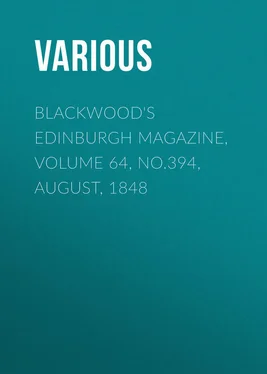Various - Blackwood's Edinburgh Magazine, Volume 64, No.394, August, 1848
Здесь есть возможность читать онлайн «Various - Blackwood's Edinburgh Magazine, Volume 64, No.394, August, 1848» — ознакомительный отрывок электронной книги совершенно бесплатно, а после прочтения отрывка купить полную версию. В некоторых случаях можно слушать аудио, скачать через торрент в формате fb2 и присутствует краткое содержание. Издательство: Иностранный паблик, Жанр: periodic, foreign_edu, Путешествия и география, на английском языке. Описание произведения, (предисловие) а так же отзывы посетителей доступны на портале библиотеки ЛибКат.
- Название:Blackwood's Edinburgh Magazine, Volume 64, No.394, August, 1848
- Автор:
- Издательство:Иностранный паблик
- Жанр:
- Год:неизвестен
- ISBN:нет данных
- Рейтинг книги:5 / 5. Голосов: 1
-
Избранное:Добавить в избранное
- Отзывы:
-
Ваша оценка:
- 100
- 1
- 2
- 3
- 4
- 5
Blackwood's Edinburgh Magazine, Volume 64, No.394, August, 1848: краткое содержание, описание и аннотация
Предлагаем к чтению аннотацию, описание, краткое содержание или предисловие (зависит от того, что написал сам автор книги «Blackwood's Edinburgh Magazine, Volume 64, No.394, August, 1848»). Если вы не нашли необходимую информацию о книге — напишите в комментариях, мы постараемся отыскать её.
Blackwood's Edinburgh Magazine, Volume 64, No.394, August, 1848 — читать онлайн ознакомительный отрывок
Ниже представлен текст книги, разбитый по страницам. Система сохранения места последней прочитанной страницы, позволяет с удобством читать онлайн бесплатно книгу «Blackwood's Edinburgh Magazine, Volume 64, No.394, August, 1848», без необходимости каждый раз заново искать на чём Вы остановились. Поставьте закладку, и сможете в любой момент перейти на страницу, на которой закончили чтение.
Интервал:
Закладка:
The Indian women who follow the fortunes of the white hunters are remarkable for their affection and fidelity to their husbands, the which virtues, it must be remarked, are all on their own side; for, with very few exceptions, the mountaineers seldom scruple to abandon their Indian wives, whenever the fancy takes them to change their harems; and on such occasions the squaws, thus cast aside, wild with jealousy and despair, have been not unfrequently known to take signal vengeance both on their faithless husbands and the successful beauties who have supplanted them in their affections. There are some honourable exceptions, however, to such cruelty, and many of the mountaineers stick to their red-skinned wives for better and for worse, often suffering them to gain the upper hand in the domestic economy of the lodges, and being ruled by their better halves in all things pertaining to family affairs; and it may be remarked, when once the lady dons the unmentionables, she becomes the veriest termagant that ever henpecked an unfortunate husband.
Your refined trappers, however, who, after many years of bachelor life, incline to take to themselves a better half, often undertake an expedition into the settlements of New Mexico, where not unfrequently they adopt a very "Young Lochinvar" system in procuring the required rib; and have been known to carry off, vi et armis , from the midst of a fandango in Fernandez, or El Rancho of Taos, some dark-skinned beauty – with or without her own consent is a matter of unconcern – and bear the ravished fair one across the mountains, where she soon becomes inured to the free and roving life which fate has assigned her.
American women are valued at a low figure in the mountains. They are too fine and "fofarraw." Neither can they make mocassins, or dress skins; nor are they so schooled to perfect obedience to their lords and masters as to stand a "lodge poleing," which the western lords of the creation not unfrequently deem it their bounden duty to inflict upon their squaws for some dereliction of domestic duty.
To return, however, to La Bonté. That worthy thought himself a lucky man to have lost but one of his wives, and the worst at that. "Here's the beauty," he philosophised, "of having two 'wiping sticks' to your rifle; if the one break whilst ramming down a ball, still there's hickory left to supply its place." Although, with animals and peltry, he had lost several hundred dollars' worth of "possibles," he never groaned or grumbled. "There's redskin will pay for this," he once muttered, and was done.
Packing all that was left on the mule, and mounting Chil-co-thē on his buffalo horse, he shouldered his rifle and struck the Indian trail for Platte. On Horse Creek they came upon a party of French 5 5 Creoles of St Louis, and French Canadians.
trappers and hunters, who were encamped with their lodges and Indian squaws, and formed quite a village. Several old companions were amongst them; and, to celebrate the arrival of a "camarade," a splendid dog-feast was prepared in honour of the event. To effect this, the squaws sallied out of their lodges to seize upon sundry of the younger and plumper of the pack, to fill the kettles for the approaching feast. With a presentiment of the fate in store for them, the curs slunk away with tails between their legs, and declined the pressing invitations of the anxious squaws. These shouldered their tomahawks and gave chase; but the cunning pups outstripped them, and would have fairly beaten the kettles, if some of the mountaineers had not stepped out with their rifles and quickly laid half-a-dozen ready to the knife. A cayeute, attracted by the scent of blood, drew near, unwitting of the canine feast in progress, and was likewise soon made dog of, and thrust into the boiling kettle with the rest.
The feast that night was long protracted; and so savoury was the stew, and so agreeable to the palates of the hungry hunters, that at the moment when the last morsel was being drawn from the pot, and all were regretting that a few more dogs had not been slaughtered, a wolfish-looking cur incautiously poked his long nose and head under the lodge skin, and was instantly pounced upon by the nearest hunter, who in a moment drew his knife across the animal's throat, and threw it to a squaw to skin and prepare it for the pot. The wolf had long since been vigorously discussed, and voted by all hands to be "good as dog."
"Meat's meat," is a common saying in the mountains, and from the buffalo down to the rattlesnake, including every quadruped that runs, every fowl that flies, and every reptile that creeps, nothing comes amiss to the mountaineer. Throwing aside all the qualms and conscientious scruples of a fastidious stomach, it must be confessed that dog-meat takes a high rank in the wonderful variety of cuisine afforded to the gourmand and the gourmet by the prolific "mountains." Now, when the bill of fare offers such tempting viands as buffalo beef, venison, mountain mutton, turkey, grouse, wildfowl, hares, rabbits, beaver and their tails, &c., &c., the station assigned to "dog" as No. 2 in the list can be well appreciated – No. 1, in delicacy of flavour, richness of meat, and other good qualities, being the flesh of panthers , which surpasses every other, and all put together.
"Painter meat can't 'shine' with this," says a hunter, to express the delicious flavour of an extraordinary cut of "tender loin," or delicate fleece.
La Bonté started with his squaw for the North Fork early in November, and arrived at the Laramie at the moment that the big village of the Sioux came up for their winter trade. Two other villages were encamped lower down the Platte, including the Brulés and the Yanka-taus, who were now on more friendly terms with the whites. The first band numbered several hundred lodges, and presented quite an imposing appearance, the village being laid out in parallel lines, the lodge of each chief being marked with his particular totem. The traders had a particular portion of the village allotted to them, and a line was marked out which was strictly kept by the soldiers appointed for the protection of the whites. As there were many rival traders, and numerous coureurs des bois , or peddling ones, the market promised to be brisk, the more so as a large quantity of ardent spirits was in their possession, which would be dealt with no unsparing hand to put down the opposition of so many competing traders.
In opening a trade a quantity of liquor is first given "on the prairie," 6 6 "On the prairie," is the Indian term for a free gift.
as the Indians express it in words, or by signs in rubbing the palm of one hand quickly across the other, holding both flat. Having once tasted the pernicious liquid, there is no fear but they will quickly come to terms; and not unfrequently the spirit is drugged, to render the unfortunate Indians still more helpless. Sometimes, maddened and infuriated by drink, they commit the most horrid atrocities on each other, murdering and mutilating in a barbarous manner, and often attempting the lives of the traders themselves. On one occasion a band of Sioux, whilst under the influence of liquor, attacked and took possession of a trading fort of the American Fur Company, stripping it of every thing it contained, and roasting the trader himself over his own fire during the process.
The principle on which the nefarious trade is conducted is this, that the Indians, possessing a certain quantity of buffalo robes, have to be cheated out of them, and the sooner the better. Although it is explicitly prohibited by the laws of the United States to convey spirits across the Indian frontier, and its introduction amongst the Indian tribes subjects the offender to a heavy penalty; yet the infraction of this law is of daily occurrence, and perpetrated almost in the very presence of the government officers, who are stationed along the frontier for the very purpose of enforcing the laws for the protection of the Indians.
Читать дальшеИнтервал:
Закладка:
Похожие книги на «Blackwood's Edinburgh Magazine, Volume 64, No.394, August, 1848»
Представляем Вашему вниманию похожие книги на «Blackwood's Edinburgh Magazine, Volume 64, No.394, August, 1848» списком для выбора. Мы отобрали схожую по названию и смыслу литературу в надежде предоставить читателям больше вариантов отыскать новые, интересные, ещё непрочитанные произведения.
Обсуждение, отзывы о книге «Blackwood's Edinburgh Magazine, Volume 64, No.394, August, 1848» и просто собственные мнения читателей. Оставьте ваши комментарии, напишите, что Вы думаете о произведении, его смысле или главных героях. Укажите что конкретно понравилось, а что нет, и почему Вы так считаете.












